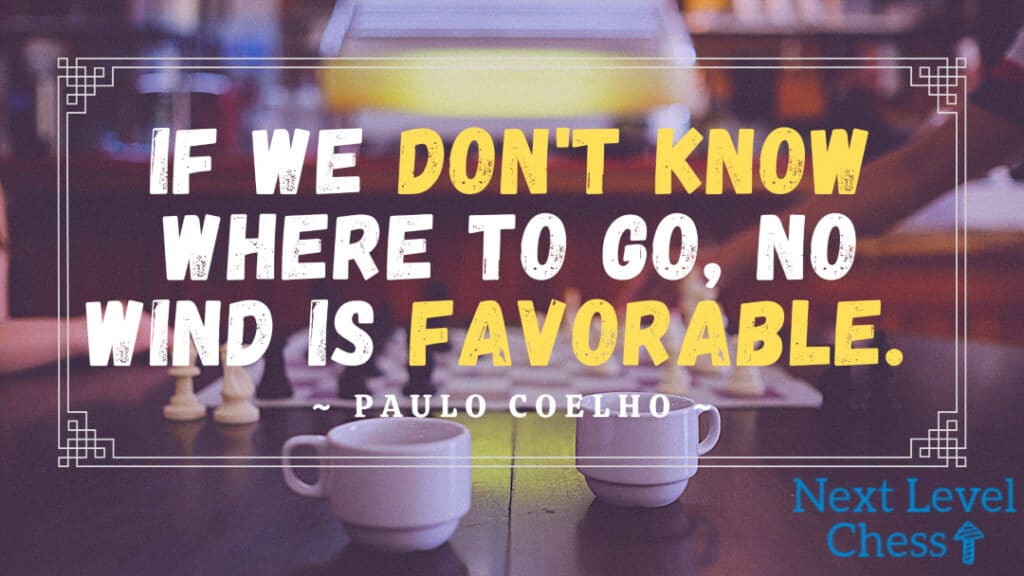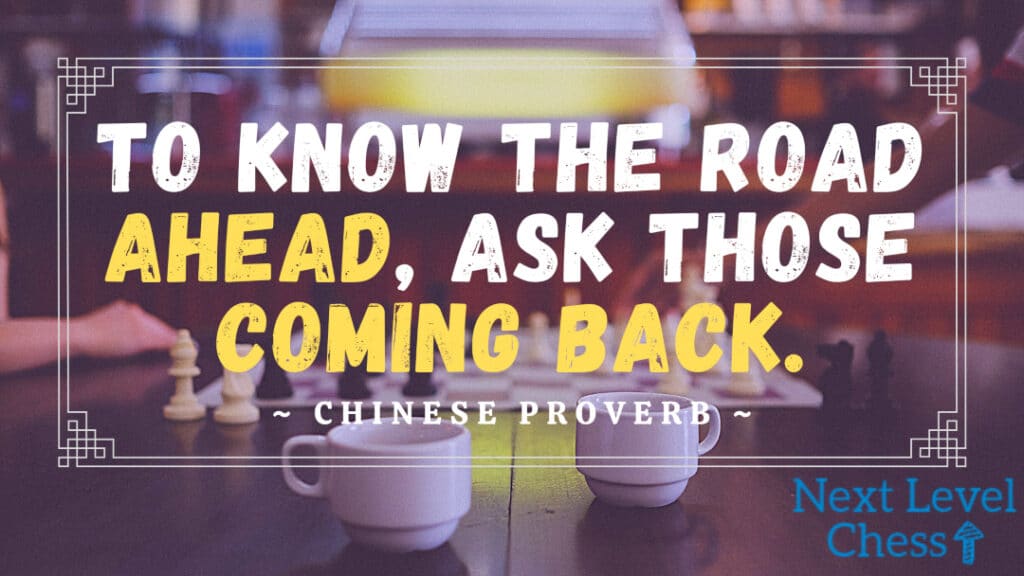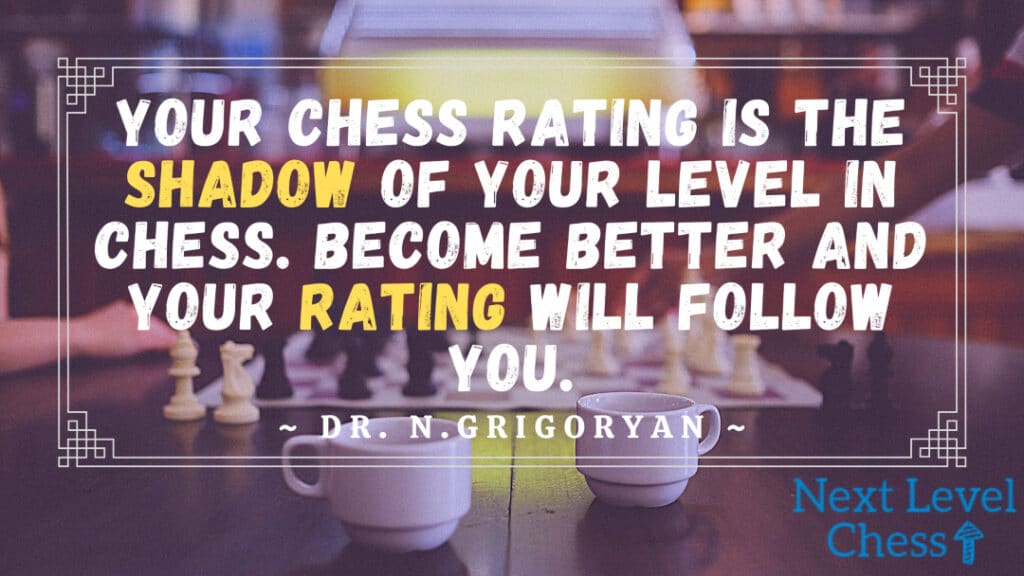This is a guest article from Grandmaster Avetik Grigoryan. He is a great friend of mine and an amazing Chess Coach. He is also the founder and CEO of ChessMood, an online chess learning website that I can wholeheartedly recommend.
After coaching many amateur players, I noticed something quite interesting…
Nearly all of them were making the same five costly Amateur mistakes.
And when I say costly, I don’t just mean they slow your growth or lower your rating, but they waste your money and time too.
In fact, for many years I made these mistakes myself on my journey to becoming a GM. ????
Curious? Let’s start with the first one…
Amateur Mistake #1: Random growth
Most amateurs start their journey without any clear chess goals.
They don’t know what exactly they want to achieve – long-term or short-term. And consequently, they end up wherever the wind takes them.

Of course, your goals can be changed, updated, and adjusted – but they should exist. And, they should be your goals. Not your families’, nor your friends’.
Many kids play chess because their parents dream of them becoming the world champion. But that’s their parents’ dream, not theirs. So eventually, they stop playing.
You can’t set goals like becoming a GM just because it sounds like a nice achievement. You need to have a WHY behind each of them.
Why do you want to achieve what you want to achieve?
If your goal is to get a FIDE rating of 2000, why do you want it?
Maybe you want to get to that level so you can beat your brother-in-law whenever you meet him? Perhaps you want to stand out at your local chess club? Be honest with yourself.
Even if you just enjoy playing chess and simply want to become better without having any clear goals, admit it!
Recently I had an interesting talk with a friend that goes to a chess club and plays a blitz tournament every Sunday.
During the tournaments, he feels stressed. Especially if the first few rounds don’t go well, he ends up with bad results for the entire tournament as his nerves kick in and he comes home with his day ruined.
When I asked him why he goes there, he said, “Just for fun. I love playing chess.”
Then I asked, “Are you sure you don’t have any ambitions? Are you sure you’re honest with yourself when you say you go to play just for fun?”
Silence…
It’s very important to have clear goals and be honest with yourself. If not, you’ll end up somewhere totally different from where you want to be.
Amateur Mistake #2: Not having the RIGHT study plan
I often see amateurs post very vague open-ended questions on chess forums or social media groups like:
“Hey everyone, I’m a chess lover and I want to improve. Who can give me a study plan?”
Or else, “Which openings should I study?”
What follows is 50-100 comments with everyone recommending different books, courses, and openings. The person who asked the question either ends up completely confused, or worse, finds themselves heading in the wrong direction.
The right study plan is something that should be personalized to your specific needs and depends on many factors, including:
1. Your level
2. Your goal
3. The time and budget you can invest
4. Your weaknesses and strengths
Depending on your answers, your ideal study plan will be very different.
Now you may be wondering, where’s the best place, and who are the ideal people to ask for recommendations?
Well, here’s the third common mistake chess amateurs make…
Amateur Mistake #3: Not asking for recommendations from the right people
Imagine you’re lost in the jungle. Would you ask for directions from someone who’s also lost and trying to figure out an escape route? Or from a guide who conducts tours every day?
The answer is obvious, isn’t it?

Yet many chess amateurs make the mistake of asking for advice from someone who’s trying to achieve the same goal that they want to, rather than from someone who’s already done it.
If you want to become an FM, you want to be sure to ask for recommendations from someone who’s at least an FM, or has students whom they helped to get there.
Asking for recommendations from the right people will tremendously speed up your growth.
Amateur Mistake #4: Choosing the wrong openings
When it comes to choosing the best openings, there are so many mistakes I see that I’ll split this one mistake into four mistakes ????
Mistake #1
Many amateurs pick an opening after watching a few YouTube videos and learning a dubious variation.
The thing is that most of the top YouTube content with millions of views is made for fun.
Why?
If you’re a YouTuber and you try to teach chess players how to play the Sicilian Najdorf variation, your views will be far fewer compared to if you teach a fun gambit.
Some YouTubers don’t care about the views and teach what they think is right, but others care much more about their views and ad revenue.
If you start searching for the right opening choice on YouTube, the algorithm isn’t designed to help you find the best videos, only the most popular ones. Most of the time this means you’ll end up learning a fun opening, but not the right one.
Mistake #2
Another common occurrence is when someone sees an ad for an opening, reads the description of the video course, and immediately clicks on the buy button.
99% of the time course descriptions aren’t written by the authors. Instead, they’re written by marketers who know what to write to persuade you to buy them.
Some even add fake testimonials to get a few more sales.
You don’t want to buy a course and learn 1.f4 as your first opening because the marketer described it as the best one.
Mistake #3
A coach forces you to play their openings.
Sometimes they might be right.
But more often it’s just easier for them to teach you what they already know. So you should be very careful when hiring a chess coach.
Mistake #4
Many try to learn from the very best. If you’re a 2600 rated Grandmaster and you try to play the same openings that Caruana plays, it might work out for you.
But if you’re an amateur that tries to learn top players’ openings, you’ll end up in trouble!
Let me tell you something that happened to me recently.
Last year, I hired a coach to help me improve my swimming skills. I couldn’t learn the technique he was teaching me, so I decided to Google it and try to understand it myself. In the videos, I saw a very different technique from what my coach was teaching me and that the top swimmers were using.
The next day I approached him, slightly confused ????
But his answer put me in the right place.
He said “You’re right. They swim with the best technique. But for swimming that way, first, you need to learn this, then that, then that, and only then you can learn the technique the best swimmers use.”
If you see a top-level player regularly playing 1…g6, it doesn’t mean they started their career with 1…g6.
Some time ago one of my amateur friends bought 3 books about 1.Nf3.
When I asked him why he said, “Kramnik’s favorite move is 1.Nf3 and his best results are with this move.”
What he missed is that at the beginning of his career, Kramnik played 1.e4, then switched to 1.d4 and only then to 1.Nf3!
Another problem is that you don’t see how much effort top players put into playing big openings like the Grünfeld or the Sicilian Najdorf variation.
Would you still want to play the Petroff if you could see how many lines Caruana has to memorize to play his variations?
It’s unlikely that you have as much time as the top players do. And even if you did, it might be smarter to spend more time on middlegames or endgames. Sitting for many hours in front of your laptop, with cloud engines running and checking for new novelties every day is not going to be a good use of your time.
Still, you don’t want to play crappy openings which only work if your opponents are unprepared.
Now the problem…
Can you start with crappy openings and then switch to more serious ones?
Yes, but your foundations will be weak.
If you start your career with 1.b3, your foundational knowledge won’t be strong. You won’t know how to fight for the center, how to maintain it, and how to push forward. Neither will you learn about the importance of tempos and many other must-know skills.
In other words, without a strong foundation, you won’t be able to build up more floors of your chess growth.
Image: “The building is only as tall as the foundation is strong enough to build on.”
During their careers, all the top players have played “interesting openings” like 1.b3 or 1…g6. But they’ve never started their career that way.
The Solution
So what’s the answer then? What is the best opening for you to learn?
The answer will depend, again, on your level, goals, and the amount of time you can invest in your chess. Noël himself wrote an excellent article about how to find the “best” opening for you which I advise you to go and check out!
My advice
I have one tip for you. Ask for recommendations, not only from people who have already achieved what you want to but from people who have no biased interests.
What do I mean by that? For example, don’t ask someone what to play against 1.e4 if they’ve recorded or written a book about the French Defense. Most probably their answer will be to play the French Defense.
Instead, ask someone neutral.
For instance, I was always a 1.d4 player. But I knew that if I’d started playing 1.e4 at the start of my career, I’d have become a GM much earlier. So when I switched from playing professionally to coaching, I learned an entire 1.e4 repertoire from scratch to teach my students.
In the same way, if someone played the King’s Indian Defense but recommends you to learn the Grünfeld, the advice is more trustworthy.
Amateur Mistake #5: Being too focused on your rating instead of improvement
Most people see their rating as the ultimate indicator of whether they’ve grown or not.
But it’s incredibly important to forget about your rating and focus on our growth.
Yes, it’s very easy to say, but tough to do. I know this first-hand.
When I was a kid, there was a day that changed my career.
I was off to play a tournament when my father asked me what my goal was
I said, “In the last tournament I lost 10 points, now I want to gain them back!”
My father took a deep breath, put his hand on my shoulder, and said:

That was the day after I started to truly fight like a gladiator, stopped agreeing to draws because I would raise 2 rating points, and grew exponentially.
Focusing too much on your rating can also make your mood unstable.
You might play a great tournament, experiment with some new openings, play fighting chess, but because in the end, you lost 5 rating points, you end up feeling disappointed.
Or you play online chess, lose 25 points, and don’t want to talk to your spouse during dinner. ????
Focus on growth!
Here’s another lesson I learned while I was playing professional poker.
Poker is one of the few “unfair” games in the world when you can play perfectly well, do all your best moves, and still lose.
So, the best poker players don’t win every day. They just do their best and know that overall they’ll be winning at the end of each year.
I was good enough to win and make a living. But I was far from the best. I found it hard to control myself, particularly when I was playing very well but would still see -$2000 in my account at the end of the day.
I had a problem with my mood. So, what did I do?
I made the information about the balance on my account invisible, so I had no clue whether I’d won or lost money at the end of my playing sessions. That way, I forced myself to focus on the game and to do my best.
I would review my results only at the end of each month.
When it comes to chess growth, or for that matter, most aspects of life where you want to grow, you need to do the same.
Focus on the journey instead of the destination.
In chess, focus on improving and the rating points will follow!
Conclusion
Even as a professional chess player, I made these mistakes:
- I didn’t have a clear goal and didn’t have a strong WHY.
- My growth was random without a concrete plan.
- I would ask my friends about which books to read, instead of asking experienced coaches.
- I played many openings which I don’t recommend to my students.
- And I became too focused on rating instead of on improving.
At some point I fixed them – otherwise, I would never have become a GM.
I just wish someone had opened my eyes earlier and pointed out my mistakes.
Now for my last piece of advice. 🙂
This is a very beautiful game. No matter what your results are, never stop enjoying its beauty. Keep having fun every time you play and keep the #CoGro! (Constant Growth)
GM Avetik Grigoryan
Ps: If you liked this article, make sure to check out more from Avetik on ChessMood.